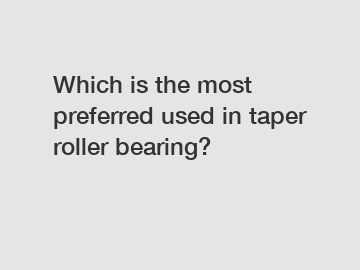Mar. 10, 2024
Mechanical Parts
Taper roller bearings are essential components in various industrial applications, providing support for rotating shafts and helping reduce friction and wear. These bearings consist of inner and outer races with tapered rollers set between them, allowing for radial and axial load capabilities. When it comes to designing and manufacturing taper roller bearings, certain materials are preferred for their specific properties and performance characteristics.
### Steel.
Steel is the most commonly used material in taper roller bearing construction due to its high strength, durability, and ability to withstand heavy loads. Bearing components such as the inner and outer races, as well as the tapered rollers themselves, are typically made from high-grade steel alloys that have been specially heat-treated to enhance their hardness and resistance to wear. Steel bearings are known for their reliability and longevity, making them ideal for heavy-duty applications in industries such as automotive, aerospace, and machinery.

### Ceramic.
Ceramic taper roller bearings are gaining popularity in recent years due to their superior hardness, low friction, and resistance to corrosion and heat. These bearings are typically made from silicon nitride or zirconia ceramics, which offer excellent wear resistance and can operate at higher speeds and temperatures than traditional steel bearings. While ceramic bearings are more expensive than their steel counterparts, they are often chosen for specialized applications where performance and longevity are critical, such as in high-speed machining or extreme environments.
### Composite Materials.
Some manufacturers use composite materials in taper roller bearings to achieve specific performance goals, such as weight reduction, corrosion resistance, or improved damping characteristics. These composites are typically formed by combining different materials, such as polymers, fibrous reinforcements, and fillers, to create bearings with unique properties that cannot be achieved with steel or ceramic alone. Composite bearings are commonly used in applications where weight savings are important, such as in lightweight vehicles or aerospace components.
### Plastics.
Plastic taper roller bearings are another alternative to traditional steel bearings, offering benefits such as corrosion resistance, quiet operation, and low friction. These bearings are typically made from engineering plastics such as nylon, polyethylene, or PTFE, which have been reinforced with fibers or fillers to enhance their mechanical properties. Plastic bearings are often chosen for applications where lightweight, non-metallic components are required, such as in food and beverage processing equipment or medical devices.
In conclusion, the choice of material for taper roller bearings depends on the specific requirements of the application, including load capacity, speed, temperature, and environmental conditions. While steel bearings remain the most widely used due to their proven performance and cost-effectiveness, ceramic, composite, and plastic bearings offer unique advantages for specialized applications. By selecting the right material for their taper roller bearings, manufacturers can ensure optimal performance and reliability in their machinery and equipment.
For more information about taper roller bearings or to discuss your specific requirements, please contact us.
If you are looking for more details, kindly visit Chinese Top Quality Bearing, Leading Tapered Roller Thrust Bearings Exporter, Roller Contact Bearing.
If you are interested in sending in a Guest Blogger Submission,welcome to write for us!
All Comments ( 0 )